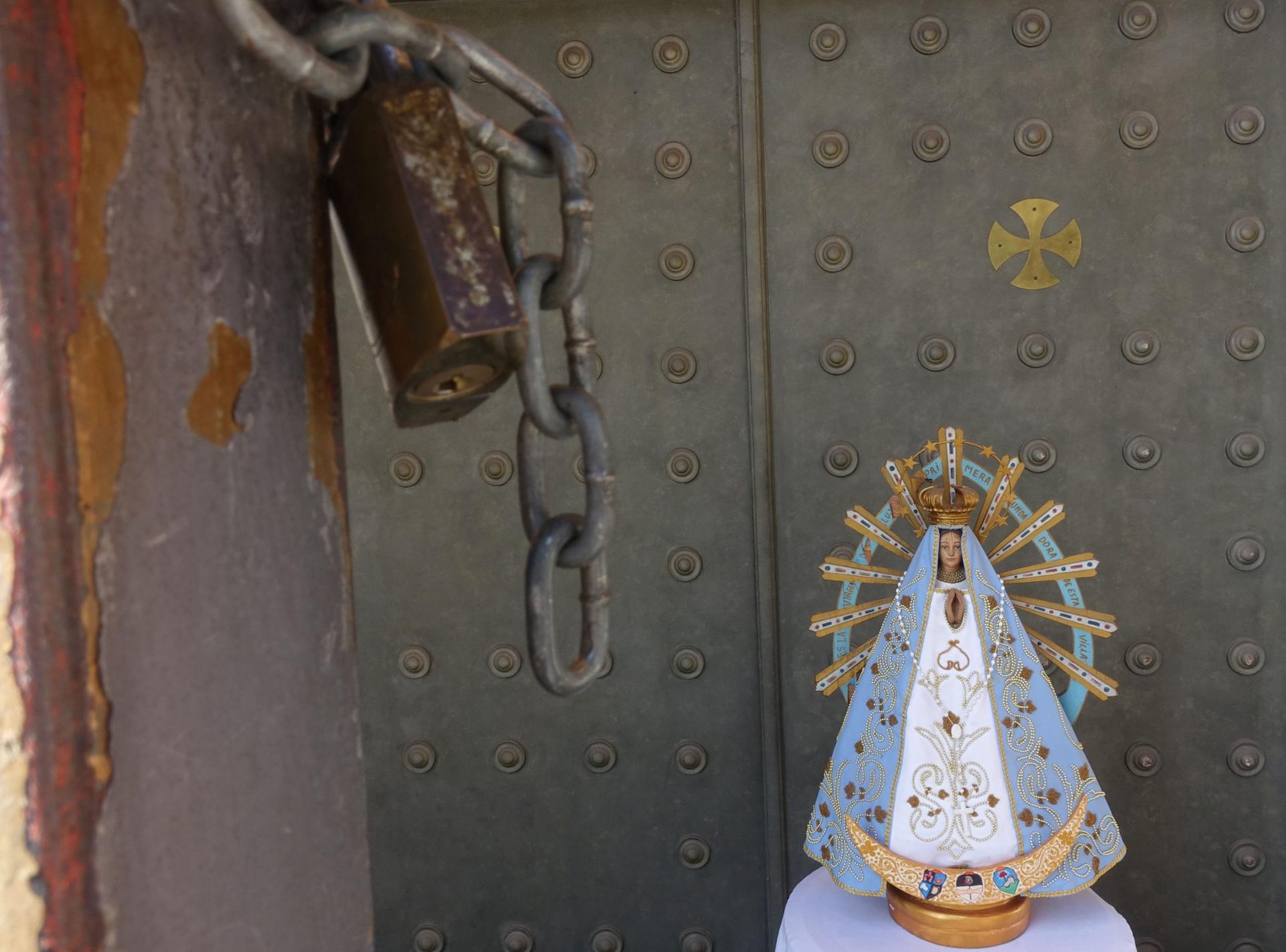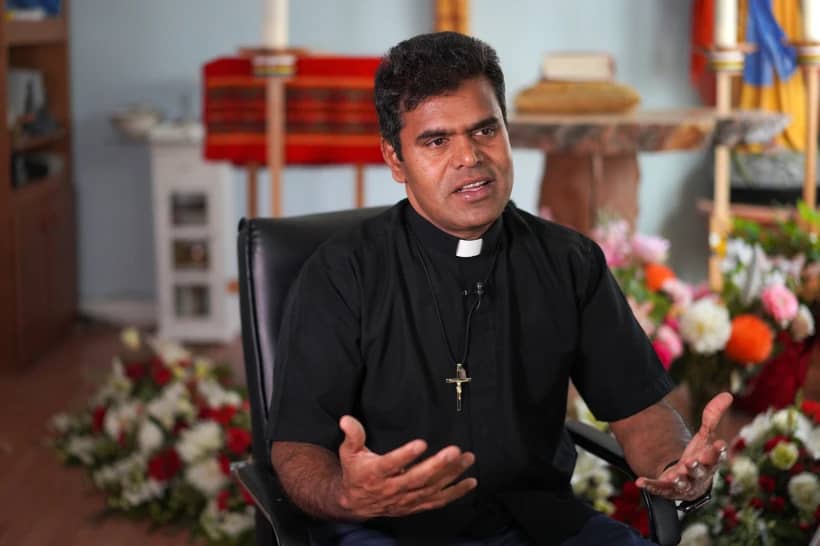ROSARIO, Argentina — One of the many places where Mass is still not available due to the restrictions of the COVID-19 pandemic is Pope Francis’s former Archdiocese of Buenos Aires.
Although public liturgies are allowed in many other parts of Argentina, the nation’s capital is harder hit by the pandemic, leading Church authorities to get creative in fulfilling the spiritual needs of the population.
Just to name the one example, there’s Father Javier Klajner, the parish priest of Santa Magdalena Sofia Barat, who began celebrating Mass online over five months ago, on March 19.
“We have daily Mass online, and then on Sundays and other feast days, we have members of the community recording the readings and the songs, because we use a software that allows for live transmission and adding videos in between,” he told Crux on Tuesday.
Each transmission begins with praying the rosary, and ends with a half-hour of Eucharistic adoration, in an attempt to substitute for the perpetual adoration chapel the parish opened last year and drew 200 worshippers a week.
In addition, Klajner and his associate pastor conduct a lectio divina live every day at 7:00AM, which is available on YouTube and other social media; they’ve organized online retreats; an 8-week spiritual course attended by 150 people; started a program letting the youth taking over the “social” aspects of the parish, including operating the Caritas office three times a week and preparing weekly hot meals for the homeless and others in need of food; and have welcomed 10 new extraordinary ministers of the Eucharist to bring Holy Communion to the elderly and others who are sheltering in their homes.
For a month, the parish has been offering Communion on Sunday mornings during a two-hour period – although Mass is still not allowed – and hearing confessions.
Last week, the priests began conducting short, private ceremonies for the families of the deceased who have taken their ashes to the parish.
“They weren’t able to say goodbye, they were deprived the possibility of a funeral, and they can’t even say a Mass for their loved ones?” Klajner said, with a palpable frustration.
Different religious groups in greater Buenos Aires met with the civil authorities earlier this week seeking to have religious services restarted during the first half of September.
Auxiliary Bishop Enrique Eguía Seguí of Buenos Aires said that the Church hopes the request will be approved.
The prelate, who took part in the meeting with the government authorities, said that “there are difficulties for the approval of the celebrations of Masses, but we are already in a time that it is a priority that these are carried out.”
“In that meeting it was said that this would be possible in the first half of September and the most auspicious number is 25 percent of the capacity of the place, but without exceeding approximately 40 faithful,” he said.
The gradual opening of the city, already in its third phase, the bishop says, includes the understanding from the government that “the exercise of religious practice for people of faith” helps their mental and spiritual health.
But Klajner said the limitations on the size of congregations is arbitrary and a double standard.
“My parish is three times the size of the supermarket down the street. Yet, we’re only allowed to have 10 people in here for silent prayer, and they’re allowed 15 people buying groceries at the same time? It’s a lot more plausible to get coronavirus at the supermarket than at church.”
The priest said this isn’t “covert religious persecution,” but puts the blame on ignorance.
“There’s a lack of understanding of what religious life means for those who believe,” he said.
He also noted the government asked the church to open so that people could get the flu shot, but during the first weeks, people weren’t allowed to stay and pray.
“There are many ways, if you have the good will, to guarantee social distancing,” he said. “We give communion in the hand, and to those who want it in the mouth, they come at the end, accepting the risk they’re taking.”
“I wasn’t going to go to war over this issue, even if there’s a solid argument: Jesus didn’t give communion to the Apostles, he cut the bread and shared it with them,” Klajner said.
Similarly, he avoided engaging those who, at the beginning of the crisis, demanded communion as a right.
“How many martyrs we have, who spent years in prison, without access to the Eucharist, and they never lost their faith? My hope is that, when all is said and done, people really do grow in their desire to be with Jesus and get to know him, and that it wasn’t all just a protest,” he said.
Still, after 160 days of quarantine, some people in the capital have joined a growing network of “clandestine” Masses, often taking place in private homes.
Maria – not her real name – has been attending such celebrations since June. A life-long Catholic who’s normally a daily massgoer, she has been vocal on social media criticizing civil authorities and even the Argentine bishops for not doing more to let the faithful return to religious services.
“Before I found out about the clandestine Masses, we had a priest, friend of the family, who said private Masses for us,” she told Crux. “You find out of the time and place through WhatsApp, and the network of people who want to attend grows.”
Maria said her conscious is clear despite the fact that she’s challenging both civil and religious authorities, because “the health of our souls is above the health of the body, and in every Mass I’ve attended, we’ve taken the necessary safety measures, including physical distancing.”
“The temporal government has no faculties to suspend Masses, and the bishops could already have acted so that we have it back, as has been the case in other countries,” Maria said, before adding that she’s not worried about being caught by authorities: “The blood of the martyrs challenges us.”
A priest who has celebrated a Mass “in the catacombs,” as he puts it, said it’s not about challenging the authorities, but about trying to fulfill what he honestly believe is a need for many people.
There have been no “Masses in parking lots” in Buenos Aires, and “it’s been five months. Not a few weeks.”
Much like Klajner, he doesn’t see this ban as religious persecution, but as “an ignorance of the relevance the life of faith has for many of us,” and this includes the sense of community, which is lost with the liturgy being celebrated online.
He too, has organized a plethora of online activities, but by the third month of the ban on public worship, he couldn’t ignore the fact that many needed “in person” conversations and that “sense of sharing your faith with others that you can’t always get through the computer.”
“I believe authorities are perplexed by the situation, and that the bishops haven’t been strong enough in expressing the need for in-person religious services to recommence,” he said. “We’ve lost the ability to dialogue with people who think differently, acknowledging that the voice of the Church is not irrelevant.”
Follow Inés San Martín on Twitter: @inesanma














